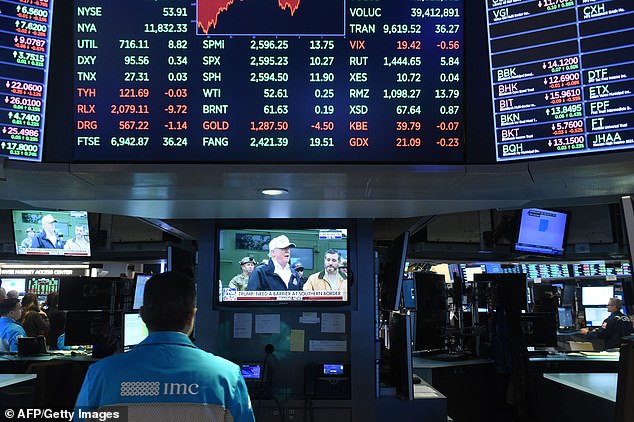Another Covid crash is on the way, IMF warns investors amid fears markets are becoming increasingly detached from reality
Investors should brace themselves for another coronavirus crash, the International Monetary Fund has warned.
Shares have rebounded since the global Covid-19 pandemic sparked a meltdown on financial markets in February and March.
But the Washington-based watchdog – which is predicting the worst global recession since the Great Depression – raised fears that stock markets are becoming increasingly detached from reality.
Crash warning: The IMF – which is predicting the worst global recession since the Great Depression – raised fears that stock markets are becoming increasingly detached from reality
And it warned that a second wave of infections – resulting in fresh lockdowns – could trigger another share price rout by adding ‘financial stress on top of an already unprecedented economic recession’.
In an update to its half-yearly global financial stability report, it pointed out that governments around the world have spent billions trying to prop up their economies.
This, it said, has ‘boosted market sentiment’, helped to protect businesses and jobs, and fuelled hopes of a swift recovery as the virus fades and lockdowns are lifted.
But it warned that ‘bullish’ investors appear to be banking on a quick ‘V-shaped’ recovery, and continued support from central banks and governments.
Noting that the resurgence of the S&P 500 in the US is out of step with soaring job losses and signs of a severe recession, it said: ‘Amid huge uncertainties, a disconnect between financial markets and the evolution of the real economy has emerged, a vulnerability that could pose a threat to the recovery should investor risk appetite fade.’
In the UK, more than £30billion of taxpayers’ money has been spent so far on supporting almost 12m workers, while the Bank of England has slashed interest rates to a record low of 0.1 per cent and injected another £300billion into the economy via quantitative easing.
It total, the IMF said the world’s central banks have snapped up £4.75billion of assets since January – more than double the amount bought during the Great Recession more than a decade ago.
Having plunged by a third, shares in Britain’s biggest blue-chip stocks have rallied 30 per cent.
The FTSE 100 was trading above 7,600 points early this year but dropped below 5,000 points on March 23, the day the lockdown was announced.
It rallied to almost 6,500 points earlier this month and closed yesterday at 6,147.14. The rally in the US has been even more dramatic, with the S&P 500 rebounding 44 per cent over a similar period.
But the prospect of more outbreaks, more lockdowns, and a slower recovery have rattled investors in recent days.
The IMF also warned that the pandemic could ‘crystallise other financial vulnerabilities that have built up over the past decade.’
It warned ‘corporate and household debt burdens could become unmanageable for some borrowers’ during a severe recession.
This, in turn, will place huge pressure on banks as companies go bust and cannot repay their loans, and households cannot keep up with their payments.
- UK exports will take a £50billion hit due to the coronavirus pandemic, falling by 6 per cent to 8 per cent in 2020 compared to last year, according accountancy firm PwC.
